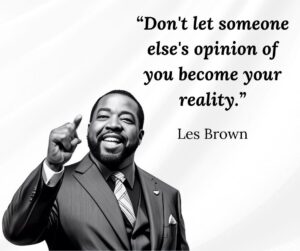In a world filled with opinions, judgments, and unsolicited advice, it's easy to let the voices of others drown out your own. Les Brown’s timeless message, “Don’t let someone else’s opinion of you become your reality,” is a powerful reminder that your life’s trajectory should be defined by your beliefs, not the limitations imposed by others.
This article explores the profound wisdom behind Brown’s words, delves into the reasons people allow external opinions to shape their lives, and offers actionable steps to reclaim control over your narrative.
The Weight of Opinions
Opinions are everywhere. From family to friends, colleagues, and even strangers, people form judgments about your choices, abilities, and worth. While some feedback is constructive, much of it is subjective and often reflects the speaker’s insecurities or biases rather than objective truth.
When we internalize these opinions, they can create self-doubt, lower self-esteem, and even deter us from pursuing our dreams. For instance, an offhand comment like, “You’re not smart enough for that career,” can echo in your mind, planting seeds of fear and inadequacy that grow over time.
Why Do We Let Opinions Define Us?
- The Need for Approval
Human beings are inherently social creatures. From an early age, we’re conditioned to seek validation from parents, teachers, and peers. This desire for approval often carries into adulthood, making us susceptible to external opinions. - Fear of Rejection
The fear of being judged or rejected can lead people to conform to others’ expectations. It feels safer to fit in than to stand out, even if it means suppressing your true self. - Past Conditioning
Many of our beliefs about ourselves stem from childhood experiences. A parent who constantly criticized you or a teacher who doubted your abilities might have unintentionally shaped how you perceive your potential. - Lack of Self-Awareness
When you don’t know who you are or what you want, it’s easier to let others dictate your path. Without a strong sense of self, external opinions can feel like truths.
The Danger of Living by Others’ Opinions
Allowing others to define your reality can lead to:
- Unfulfilled Potential: You might abandon dreams or goals because someone deemed them unrealistic.
- Loss of Identity: Constantly molding yourself to fit others’ expectations can erode your sense of self.
- Regret: Many people look back on their lives and regret the things they didn’t do because they let fear or doubt hold them back.
Reclaiming Your Narrative
To break free from the grip of others’ opinions, you must cultivate resilience, self-awareness, and inner strength. Here’s how:
- Understand the Source
Consider where the opinion is coming from. Is it based on fact, or is it merely someone projecting their fears or limitations onto you? Often, people’s criticisms have more to do with their experiences than your capabilities.
- Build Self-Confidence
Confidence is your shield against negativity. When you believe in yourself, external opinions lose their power. Focus on your strengths, celebrate your achievements, and surround yourself with supportive people.
- Clarify Your Vision
Define your goals, values, and purpose. When you have a clear sense of direction, it’s easier to stay focused and resist distractions from naysayers. Write down your aspirations and revisit them often to remind yourself why they matter.
- Practice Emotional Detachment
Not every opinion deserves your attention or energy. Learn to listen without absorbing. Acknowledge the feedback, but don’t let it linger if it doesn’t serve your growth.
- Seek Constructive Feedback
There’s a difference between criticism and constructive feedback. While opinions can be subjective, constructive feedback is specific and aimed at helping you improve. Seek advice from people who genuinely care about your success.
- Develop a Growth Mindset
Embrace challenges and view setbacks as opportunities to learn. A growth mindset helps you stay resilient in the face of negativity and empowers you to keep moving forward.
- Surround Yourself with Positivity
Your environment plays a significant role in shaping your mindset. Surround yourself with people who uplift and encourage you rather than those who bring you down.
Inspiring Examples
History is filled with people who defied others’ opinions to achieve greatness.
- Albert Einstein: Once labeled a slow learner by his teachers, he went on to revolutionize science.
- Oprah Winfrey: Fired from her first television job and told she wasn’t fit for TV, she became one of the most influential media moguls in the world.
- J.K. Rowling: Rejected by multiple publishers, she persisted and created the beloved Harry Potter series.
These individuals refused to let others dictate their reality. They believed in themselves and persevered despite the naysayers.
The Role of Self-Talk
Your internal dialogue is just as important as the opinions of others. Negative self-talk can amplify external criticism and undermine your confidence. Replace self-doubt with affirmations and reminders of your worth.
For example, instead of thinking, “I’ll never be good enough,” tell yourself, “I am capable and deserving of success.”
A Vision for the Future
Imagine a life where you are free from the weight of others’ opinions. You pursue your dreams unapologetically, live authentically, and inspire others to do the same. This vision isn’t just a fantasy—it’s attainable when you commit to owning your narrative.
Final Thoughts
Les Brown’s message is a call to action. Don’t let the voices of others drown out your inner truth. Your reality should be a reflection of your dreams, values, and potential—not the limitations others impose on you.
The journey to self-empowerment isn’t always easy, but it’s worth it. When you stop living for others and start living for yourself, you unlock a life of fulfillment, purpose, and endless possibilities.
Remember, you are the author of your story. Write it boldly, unapologetically, and with the unwavering belief that you are destined for greatness.


















